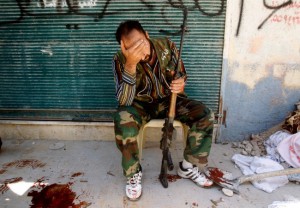The International Crisis Group (ICG) released a report warning that Libya will “free-fall” into an increasingly worsening state if certain political attainments are not “reset”
According to the ICG’s report, the Libyan political agreement, which was signed in Skhirat, Morocco in December 2015, has not brought about the solutions it was intended to bring to Libya’s political arena.
“A year ago, the conflict was between rival parliaments and their associated governments; today it is mainly between accord supporters and opponents, each with defectors from the original camps and heavily armed,” said the ICG report that was released on Friday.
“The accord’s roadmap, the idea that a caretaker government accommodating the two parliaments and their allies could establish a new political order and reintegrate militias, can no longer be implemented without change.”
The negotiations that led to the agreement were about resolving the tension that existed between the House of Representatives (HoR) in Tobruk and the General National Congress (GNC) in Tripoli.
The current Libyan government, known as the Libyan Government of National Accord (GNA), was one of the products of the agreement that received some, but seemingly not enough, support from members of the HoR and GNC.
The HoR and GNC’s opposition to the GNA continues to overwhelmed the support it received.
General Khalifa Haftar, who is based in eastern Libya and opposes the GNA, has been accused of preventing the HoR from giving the new government a vote of confidence. Haftar has been on a mission over the last two years to gain control over Libya’s eastern region.
Since the GNA is based in western Libya, Haftar has been able to avoid its authority while declaring his own in the east.
Haftar also went as far as forcibly taking over control of oil facilities in Libya’s oil crescent region from the Petroleum Facilities Guard who are loyal to the GNA. Though Haftar and the HoR agreed that the revenues would go to the Central Bank in Tripoli, his takeover of the oil facilities is a sign of his resistance to the GNA’s leadership.
The EU and US released statements condemning Haftar’s takeover of the facilities, however, leaked audio files suggest that some European nations and the US are in business with Haftar.
France admitted to its operations in Haftar controlled territory after a French helicopter was shot down by brigades resiting Haftar in Benghazi.
The EU has also expressed grave concern regarding the refugee crisis in the Mediterranean as it has become uncontrollable after the Libyan uprising in 2011 that brought down the Gaddafi regime. Around 4,220 refugees died on their way to Europe so far this year, the highest number on record, said the UN International Organization for Migration (IOM).
The ICG also expressed its concern regarding the presence of ISIS in Libya saying that there is a risk that the terrorist group will take advantage of Libya’s vulnerable and chaotic political state.
“The immediate priority thus is to avoid the violence that seems to be brewing in the Gulf of Sirte, Benghazi and perhaps Tripoli,” said the ICG report.
“Avoiding a new confrontation in the Oil Crescent is particularly urgent, combined with an agreement that the forces there allow the National Oil Corporation (NOC) to repair damaged facilities and resume exports, as Libyan law and UN resolutions demand.”
“Beyond this, a reset of the mired peace process is imperative.”
libyangazette.net



